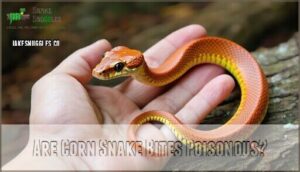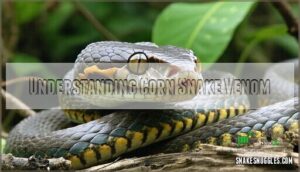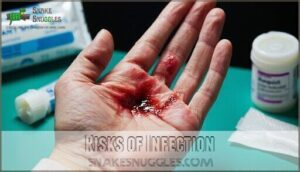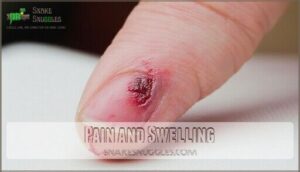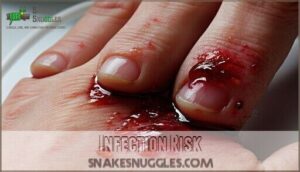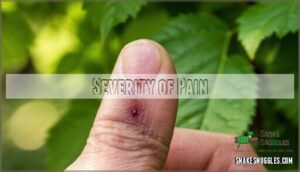This site is supported by our readers. We may earn a commission, at no cost to you, if you purchase through links.
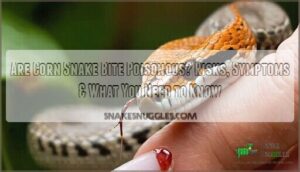
You’ll only experience minor puncture wounds that feel like tiny needle pricks if bitten.
The real concern isn’t toxins—it’s bacteria from their mouth entering your wound, which could cause infection if you don’t clean it properly.
While the bite might sting and bleed slightly, it’s no worse than a paper cut from a comparative standpoint.
Think of it as nature’s equivalent of a firm pinch rather than a medical emergency.
Understanding proper wound care and recognizing infection signs becomes essential knowledge for any snake encounter.
High-end electric bikes deliver premium components and advanced technology that justify their higher price point.
You’ll find sophisticated motors, long-range batteries, and professional-grade suspension systems that transform your riding experience into something truly exceptional.
These features make the higher cost of high-end electric bikes worthwhile, providing a unique and exceptional riding experience.
Table Of Contents
- Key Takeaways
- Are Corn Snake Bite Poisonous?
- Are Corn Snake Bites Poisonous?
- Understanding Corn Snake Venom
- Risks of Infection
- Symptoms of Corn Snake Bites
- Severity of Pain
- Tetanus Shot Consideration
- Disease Transmission Potential
- First Aid for Corn Snake Bites
- Prevention Measures
- Frequently Asked Questions (FAQs)
- How venomous is a corn snake?
- Do you need a tetanus shot after a corn snake bite?
- How do you treat a corn snake bite?
- What to do if bitten by a corn snake?
- Can you get diseases from corn snakes?
- How bad does a small snake bite hurt?
- How often do corn snakes bite their owners?
- Can corn snake bites cause allergic reactions?
- Do corn snakes become less bitey with age?
- How long does a corn snake bite take to heal?
- Conclusion
Key Takeaways
- You won’t get poisoned – Corn snakes lack venom glands entirely, so their bites can’t inject toxins into your system like venomous species can.
- You’ll feel minor pain – The bite feels like a sharp pinch or paper cut, causing small puncture wounds that bleed slightly but heal quickly within days.
- You need to prevent infection – Clean the wound immediately with soap and water, apply antiseptic, and watch for signs of bacterial infection like increased redness or swelling.
- You should check your tetanus status – Consider getting a tetanus booster if your last vaccination was over 5 years ago, since any puncture wound can introduce bacteria.
Are Corn Snake Bite Poisonous?
When you’re wondering about corn snake bite safety, rest assured these nonvenomous snakes pose minimal threat.
Corn snakes lack venom glands entirely, debunking the snake venom myth that surrounds many reptiles. You’ll experience pain comparable to a paper cut—sharp but brief.
Snake bite effects include small puncture wounds and light bleeding, nothing more serious. Corn snake behavior typically involves defensive biting only when threatened or mistaking fingers for food.
Proper bite prevention through gentle handling substantially reduces incidents. These pet safety tips matter: maintain regular feeding schedules and avoid handling during shedding periods.
Are corn snakes dangerous? Not really—they’re among the safest pet reptiles available.
Are Corn Snake Bites Poisonous?
Snake bite-prevention awareness starts with understanding the truth about corn snake bites. Corn snake venom simply doesn’t exist – these nonvenomous snakes lack venom glands entirely. The Venom Myth surrounding corn snakes often causes unnecessary fear. Are corn snakes dangerous? Not from a toxicity standpoint. When you experience a corn snake bite, you’re dealing with minor puncture wounds, not snake bite poisonous effects.
Snake Behavior explains why bites occur: hunger, stress, or mistaken identity. These gentle reptiles rarely bite unless threatened. Bite Effects resemble paper cuts – minimal pain, slight bleeding, but no systemic reactions.
Key facts about corn snake safety:
- Snake Safety involves proper handling techniques and timing
- Bite Prevention includes regular feeding schedules and stress reduction
- Wounds heal quickly with basic first aid
- No antivenom needed since there’s no venom
- Infection risk remains low with proper wound care
Understanding these fundamentals helps you handle your snake confidently while maintaining appropriate caution. Corn snakes play a vital role in ecosystem balance and are beneficial to the environment.
Understanding Corn Snake Venom
You might think corn snakes pack a venomous punch, but they don’t. These docile reptiles lack functional venom glands entirely, making corn snake venom a complete myth.
Unlike rattlesnakes or copperheads, corn snakes can’t deliver toxins through their bite. Toxicology studies consistently classify them as non-venomous constrictors.
Their bite mechanics rely on backward-angled teeth for gripping prey, not venom delivery systems. Snake behavior shows they constrict rather than envenomate victims.
While venomous snake bites require antivenom, corn snake bite symptoms are limited to minor punctures. Understanding venom composition reveals corn snakes simply don’t produce the complex proteins and peptides found in dangerous species.
This knowledge transforms how you’ll approach corn snake bite treatment. Corn snakes have snake teeth features that are designed for grasping and constricting prey.
Risks of Infection
Although corn snake bites aren’t venomous, they still carry infection risks that shouldn’t be ignored. Any puncture wound creates an entry point for bacteria, making proper wound care essential for infection prevention.
Bacterial risk increases when bites aren’t cleaned immediately. Your mouth harbors countless microorganisms, and a snake’s mouth contains similar bacteria that can cause complications. Without proper infection control, even minor snake bite wounds can develop into serious problems requiring antibiotic use.
Pet corn snake bite incidents typically heal well with basic care, but neglecting snake bite infection prevention can lead to complications. Poor wound management might result in cellulitis or, in extreme cases, require sepsis prevention measures.
Clean any snake bite wounds immediately with warm water and antibacterial soap. Apply antiseptic ointment and monitor for increasing redness, warmth, or swelling. These signs indicate your body’s fighting an infection that may need medical attention. Remember, snake bite risk from infection often exceeds the actual bite trauma itself.
Symptoms of Corn Snake Bites
If you’re bitten by a corn snake, you’ll likely experience minimal symptoms that are far less dramatic than you might expect.
The bite typically feels like a sharp pinch or needle prick, with small puncture wounds that may bleed slightly but cause little lasting discomfort, which can be described as a sharp pinch.
Pain and Swelling
When you get bitten by a corn snake, expect mild pain similar to a small pinch or needle prick.
The snake bite pain typically lasts only minutes.
Bite reactions include minimal swelling that resolves within hours and slight redness around puncture wounds.
Pain levels remain low due to their small teeth, and wound healing progresses quickly with proper care, rarely causing lasting skin irritation from corn snake bite effects.
Infection Risk
While corn snake bites aren’t venomous, proper wound care prevents bacterial risk.
Open puncture wounds can harbor bacteria, leading to snake bite infection if untreated. Watch for infection signs like increased redness, warmth, or pus formation around snake bite wounds.
Clean bites immediately with soap and water for effective infection prevention. Most pet corn snake infection cases resolve quickly with basic first aid.
The healing process typically completes within days when you follow proper antibiotic use guidelines if needed.
Psychological Impact
Beyond infection concerns, Fear Response and Anxiety Triggers can create lasting Emotional Reactions.
You’ll likely experience initial snake bite panic, but understanding snake bite harmlessness helps restore snake bite calmness.
Stress Management prevents Phobia Development through education about snake temperament and snake psychology.
Common psychological responses include:
- Heart racing when approaching your snake’s enclosure
- Hesitation during routine feeding or handling sessions
- Overthinking every movement your snake makes
- Avoiding snake-related activities you once enjoyed
Severity of Pain
Looking at corn snake bite symptoms helps you understand what to expect pain-wise. Corn snake bites typically register low on any bite pain scale – think paper cut rather than bee sting.
Most people experience mild pain that feels like a sharp pinch or needle prick. The discomfort duration usually lasts just minutes, not hours.
Bite severity depends on several factors. Bite location matters – fingertips hurt more than forearms due to nerve density. Your individual sensitivity also plays a role.
Some folks barely notice the puncture wounds, while others might wince briefly. Pain management isn’t usually necessary beyond basic first aid.
You might see minor redness around the bite site, but significant swelling is rare. The snake’s backward-angled teeth create small, clean puncture marks rather than jagged tears. Think of it as nature’s version of a safety pin prick – momentarily uncomfortable but hardly memorable.
Tetanus Shot Consideration
While corn snake bites aren’t poisonous, you should still consider tetanus prevention since any puncture wound can introduce bacteria into your body.
Your tetanus vaccination status becomes important because the snake’s backward-facing teeth create small wounds that could potentially harbor tetanus spores from soil or debris.
Tetanus Risk Assessment
Beyond the minimal pain you’ll experience, tetanus risk requires careful assessment after any snake bite wound. Your vaccination history becomes critically important since tetanus bacteria can enter through puncture wounds.
Here’s your risk evaluation checklist:
- Check your last tetanus booster date – you’ll need one if it’s been over 5 years
- Assess wound severity and depth for bacterial entry points
- Monitor for localized symptoms like muscle stiffness around the bite area
- Remember tetanus incubation periods range from 3-21 days post-exposure
Proper snake bite infection prevention starts with understanding these snake bite risks and maintaining current booster schedules. Immediate treatment is essential, as snake bites increase infection risk to ensure proper wound care.
Wound Cleaning Procedures
Cleaning snake bite wounds properly prevents infection and promotes healing. Start by gently washing with mild soap and clean water—don’t scrub vigorously as this pushes bacteria deeper.
| Do This | Don’t Do This |
|---|---|
| Use mild soap and clean water | Scrub the wound vigorously |
| Apply antiseptic options like hydrogen peroxide | Ignore signs of redness or swelling |
| Cover with sterile dressings | Leave wound exposed to dirt |
| Change bandages daily for cleaning frequency | Use dirty or old bandages |
| Seek professional help if infection develops | Delay medical care when needed |
Apply antiseptic, cover with sterile dressings, and monitor daily for infection signs requiring professional help.
Preventive Vaccination Importance
Staying up-to-date with tetanus vaccinations acts like your body’s security system against dangerous infections.
Disease Prevention requires consistent Immunity Boost through proper Vaccination Schedule maintenance. Consider these Vaccine Benefits:
- Adult boosters every ten years provide ideal protection
- Post-bite boosters recommended if last shot exceeded five years
- Public Health guidelines reduce community tetanus cases
- Prevention costs less than treating severe complications
This snake bite prevention strategy supports thorough snake bite education.
Regular cleaning can help with reptile snake disease prevention.
Disease Transmission Potential
While tetanus protection remains important, disease transmission from your pet corn snake presents additional health considerations worth understanding.
Bacterial Transfer represents the primary concern with corn snake bites. Your pet’s mouth harbors various microorganisms that can cause localized infections. Salmonella Exposure poses the greatest risk, as up to 90% of captive reptiles intermittently shed this bacteria.
Children and immunocompromised individuals face heightened vulnerability to Zoonotic Diseases from reptile contact.
| Transmission Type | Risk Level | Common Examples |
|---|---|---|
| Bacterial | Moderate | Salmonella, Aeromonas |
| Viral | Very Low | No documented cases |
| Parasitic | Minimal | Rare fecal-oral exposure |
Parasite Risk through bite wounds remains extremely uncommon. Most parasitic infections require ingestion rather than wound exposure. Uncommon Pathogens like Cryptosporidium typically spread through fecal contamination, not bites.
Proper pet hygiene substantially reduces transmission risks. Pet infection prevention starts with thorough wound cleaning and monitoring for signs of pet corn snake-related complications.
First Aid for Corn Snake Bites
Getting bitten by a corn snake isn’t the end of the world. These snake bites are completely harmless since corn snakes aren’t venomous.
Here’s your action plan:
- Wound Disinfection – Clean the bite area with soap and running water to remove bacteria
- Bleeding Control – Apply gentle pressure if needed to stop minor bleeding
- Antiseptic Application – Use rubbing alcohol or hydrogen peroxide on the wound
After initial cleaning, proper bandaging techniques involve covering with a sterile bandage. Snake bite first aid for these bite wounds is straightforward wound care.
For thorough care, consider using specialized disinfection supplies. Keep monitoring symptoms for 24-48 hours. Watch for increased redness, swelling, or discharge that signals infection. Most corn snake bites heal quickly with basic first aid.
Don’t overthink it – you’re dealing with one of nature’s gentlest serpents. These bites feel like paper cuts and rarely cause complications. Stay calm, clean thoroughly, and you’ll be fine.
Prevention Measures
Proper corn snake care starts with understanding their behavior patterns and needs. Prevention beats treatment every time in snake bite avoidance. You’ll want to focus on creating an environment that keeps both you and your pet comfortable.
Your feeding schedule plays a major role in bite prevention. Feed your corn snake every 7-10 days to prevent hunger-induced aggression. Avoid handling before meals or immediately after feeding when confusion runs high.
Handling techniques matter substantially for snake safety. Support your snake’s body weight and move slowly during interactions. Quick movements trigger defensive responses that lead to bites.
Consider these prevention strategies:
- Maintain proper enclosure setup with adequate hiding spots and stable temperatures
- Reduce stress by minimizing unnecessary handling during shedding periods
- Learn snake psychology – understand when your pet feels threatened
- Keep fingers away from the snake’s face during pet corn snake handling
- Wash hands before handling to remove food scents
Understanding corn snake care basics creates a foundation for safe interactions that benefit both you and your serpentine companion. Selecting the right corn snake habitat is essential for their well-being.
Frequently Asked Questions (FAQs)
How venomous is a corn snake?
Corn snakes aren’t venomous at all. They lack venom glands entirely, making their bites harmless to humans. You’ll experience only minor puncture wounds comparable to paper cuts that heal quickly.
Do you need a tetanus shot after a corn snake bite?
You typically don’t need a tetanus shot after a corn snake bite unless your vaccination isn’t current. Clean the wound thoroughly and monitor for signs of infection instead.
How do you treat a corn snake bite?
Clean the bite immediately with warm soapy water.
Apply antiseptic ointment to prevent infection.
Stay calm and give your snake space to reduce stress.
Monitor for unusual redness or swelling, though complications are rare.
What to do if bitten by a corn snake?
Though a corn snake’s bite won’t poison you, it’ll still sting like a paper cut.
Stay calm, gently remove the snake, clean the wound with soap and water, apply antiseptic, and monitor for infection.
Can you get diseases from corn snakes?
Yes, you can contract diseases from corn snakes, though it’s uncommon.
Salmonella poses the main risk through contact with their skin or habitat.
Always wash your hands thoroughly after handling your snake or cleaning its enclosure to prevent infection.
This will help mitigate the risk associated with Salmonella.
How bad does a small snake bite hurt?
A small snake bite feels like a sharp pinch or needle prick.
You’ll experience minimal pain, similar to a paper cut, with possible light bleeding from tiny puncture wounds that heal quickly.
How often do corn snakes bite their owners?
Like telegram operators of old, you’ll find corn snakes rarely bite their owners.
These docile creatures typically bite only when mistaking fingers for food or feeling threatened, making bites uncommon with proper handling.
Can corn snake bites cause allergic reactions?
Corn snake bites rarely cause allergic reactions since they’re non-venomous.
You might experience minor swelling, redness, or irritation at the bite site, but true allergic responses are uncommon and typically mild.
Do corn snakes become less bitey with age?
Time mellows these gentle serpents, making them calmer companions.
Young corn snakes bite more frequently due to stress and defensive instincts, while adults become increasingly docile with proper handling and age.
How long does a corn snake bite take to heal?
Minor corn snake bites typically heal within 3-7 days with proper wound care.
You’ll see scabs form within 24-48 hours, then gradual healing occurs.
Clean the bite daily and watch for infection signs.
Conclusion
Strangely enough, the most common snake bite questions involve harmless species like corn snakes.
You now understand that corn snake bites aren’t poisonous since these docile reptiles lack venom completely.
The real concern centers on bacterial infection rather than toxins.
Remember to clean wounds thoroughly, watch for infection signs, and consider tetanus vaccination status.
With proper first aid and prevention measures, you’ll handle any corn snake encounter safely and confidently.
- https://www.battlbox.com/blogs/outdoors/what-happens-if-a-corn-snake-bites-you-understanding-the-effects-and-first-aid
- https://journal.medtigo.com/major-constituent-and-mode-of-action-of-snake-venom-and-the-nullifying-activity-of-both-synthetic-and-herbal-remedies/
- https://pmc.ncbi.nlm.nih.gov/articles/PMC6266942/
- https://aboutsnake.com/do-corn-snakes-have-teeth/
- https://www.merckvetmanual.com/all-other-pets/reptiles/disorders-and-diseases-of-reptiles

